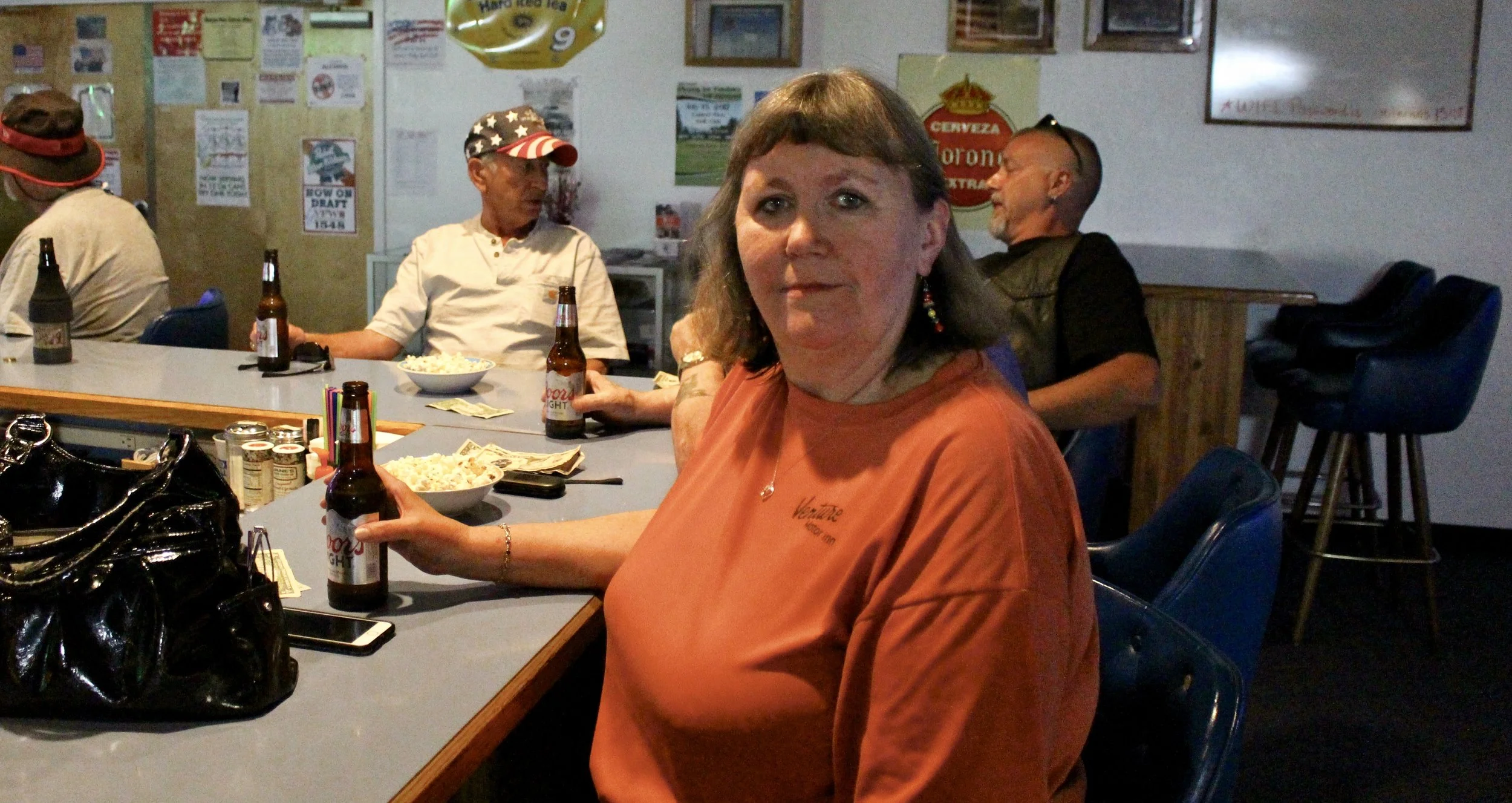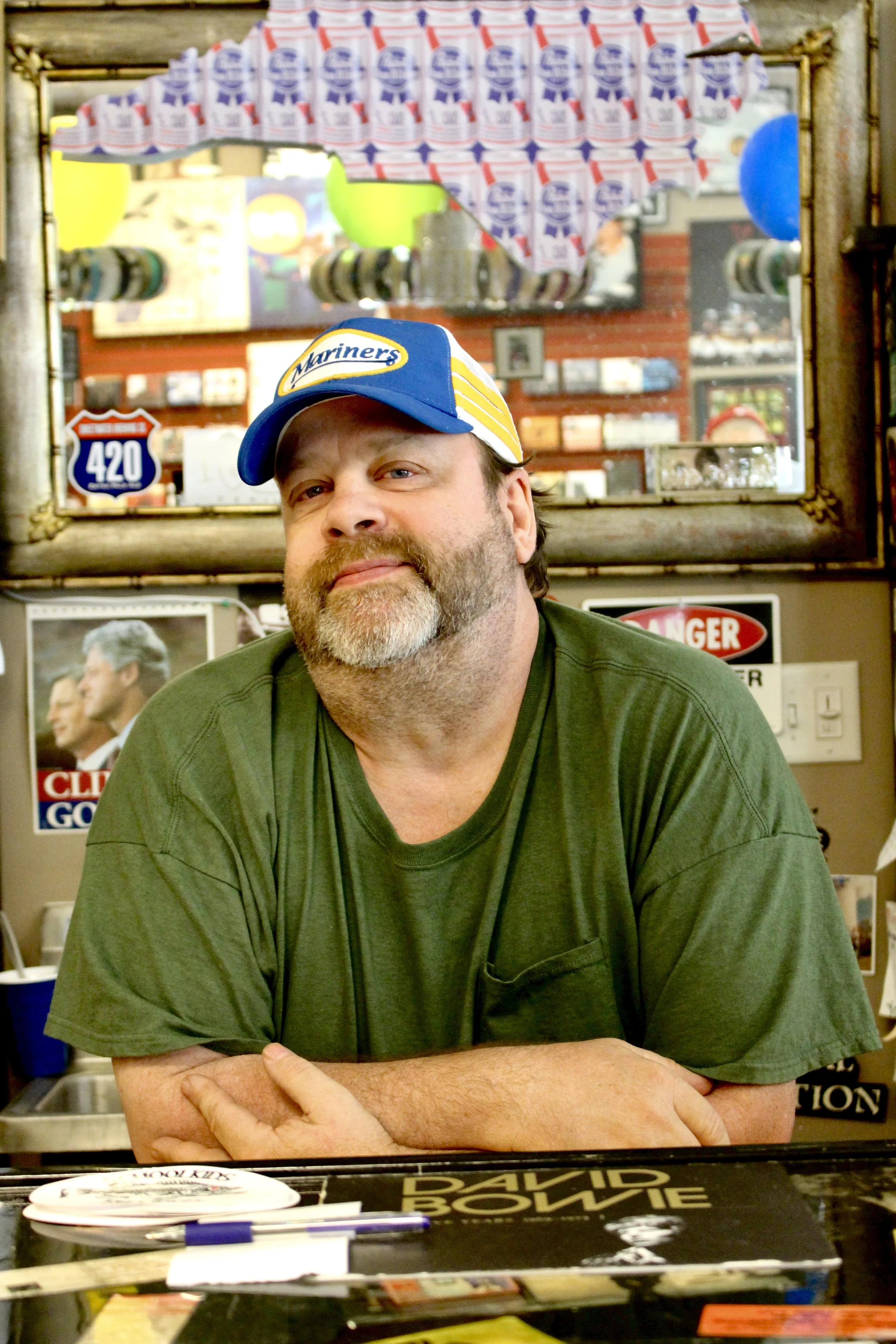The Bartender
The railroad draws the boundary to town
Almost nothing marks the turn to a little, forested town between Bonners Ferry and Sandpoint, Idaho. The locals navigate it by tree shapes. A tip from a bartender at the Libby VFW was the only reason I knew to look out for a town at all. It's as though the community almost went out of its way to ensure it stayed under the radar of any tourist or passerby. After the hidden turnoff, the town sprints past in the space of about 2 blocks. Schoolhouse, Post Office and a smattering of one-story houses abruptly run into a rail line. The tracks force the westerly road to split North-South. The road obliges, not bothering to find a way around. And at that, the town is just about explored. It's easier then, to follow the many more roads that lead out of town. Which most do, without a second thought. Naples enjoys its anonymity. For those that don't take the hint, the Northwoods Tavern is the place to be for a drink and a bite to eat. Two locals, Rog and Laurie have owned the place for a generation. Today, as the front door shuts out the heavy summer heat, Teresa is working behind the bar.
The wall behind the bar is littered with curio
“My mother lived in town, away from me so I was primarily raised by my mother’s mother. My adoptive father worked for the forest service. He was a mule skinner, so he helped build all the trails for the forest service and the lookouts back when they did firewatch. He’d pack in the supplies on mules for the trail guys and he’d be gone all summer doing that. That was before helicopters. The helicopters basically put him out of the mule business. In the wintertime when they were done building trails he was a farrier, so he made horseshoes, trimmed and shod people’s horses for them. He did logging for a while. There was a huge logging industry here when I was a kid. There used to be 2 mills in Colburn, there was Ceda-Pine, and the other one was Crown Pacific, then there was a great big one up in Bonners Ferry, but we lost all those. We’ve lost a lot of our log work and a lot of our mills. The federal government came in and closed down all the forests to logging around the late 1980s. From what I gather, a lot of it’s for protected species of animals. They locked up our forests to protect caribou and wolves and stuff like that. I went to a few of the meetings in town and what I learned is they missed a really important part in order to close the forests legitimately. They never did an economic impact study on what it would do to the economy of the area to lock down the forests. But it was kind of a slow trickle. One mill would disappear then another would close. Without timber to cut, they just couldn’t stick around. If you go to downtown Bonners Ferry you’ll see what happened. There are whole blocks where the businesses dried up and died. This bar here has been around since the early 1900s, back when Bonners Ferry took off and they built their two story brick buildings.”
The woodyard has only one tractor operating on a Tuesday afternoon
The region had apparent wounds from the loss of the industry. The one log yard down the road seems an almost quaint bit of industry, no more than 10-15 people visible working in the yard and log stacks enough to supply maybe a few towns. In Naples, Teresa felt the weight of it, as though times were better back in rosier childhood days even though childhood was anything but easy.
“As a kid, we didn’t have too much time for fun. We had lots of chores, there were no child labor laws”
This is a line heard commonly from westerners, not just Teresa, as they look back at their childhoods. Interestingly, child labor laws were born in the US with the Fair Labor Standards Act in 1936. They prohibited industrial work under 14 years of age and hazardous work until 18. Children under 16 years were not allowed to work during school hours, but were otherwise relatively unregulated. Agricultural work ages were left untouched, as they still are in Idaho. What’s revealing is the consistent assumption that the laws weren’t around. This feeling that work was a bigger part of life for kids is a keystone to people’s perspective, and the recurring suggestion that child labor laws weren’t around, speaks to a larger theme. Like with logging, it feels like the government took the right to this part of their identity. It’s an echo of a political message that has been well absorbed in this part of the country: that freedom and good living is where government isn’t. Some things would be better if they were just left alone.
The Northwoods Tavern is the main local watering hole
“There were no child labor laws so you never said you were bored. The folks could always find something for you to do, even if it was just, hey move all those rocks over there and when you’re done, move them back. You know, idle hands are the devil’s toys. So we did a lot of work, helping dad pack for the forest service, a lot of that work was peeling poles for rail fences to contain the animals when they weren’t in use. And then things for farm life. We raised almost all of our meat, milked cows, churned butter, garden, the whole 9 yards. All we needed from town were flour, sugar, the staples. But we just did chores, when you got home from school it was “take off your school clothes, put on your work clothes, get in the garden.” If you got done with chores and it was still daylight, you grabbed your fishing pole and ran as fast as your legs could take you. But that was what we did. Or we rode bicycles sometimes or had a little business selling nightcrawlers to fishermen on the 95. All of five of us did that, two brothers, two sisters, we all lived like that.
I left home and school at 17 when I was in my third year. I would have graduated in my 7th semester but I didn’t feel like I was learning anything useful there and the rules at home were, if you didn’t like the rules you leave. So I left. Ended up outside Toronto in a really rich area. Most of us here in Naples at some point want to see what’s on the other side of the mountain and end up leaving for a bit but this is home. I didn’t fare well in the city. I was one of two stay at home mothers in the area so every day after school I’d have 30 kids at the house all looking for a person in their life to give some structure and support. The cultural diversity up in Toronto was really cool, I’m glad my kids got to grow up with that. Canada takes in people from all over the world, like my neighborhood was very East Indian, and it was an interesting experience but overall the city was hard on me. When I moved back home I was 300lbs and depression off the charts. City life wasn’t for me. But when I came back Naples changed a bit, the kids were different, it seemed like stupid crime was more common. Vandalism, stealing, that kind of stuff. Seems like an economic change. The economy left and now it takes two parents to pay to raise a kid, there’s no one at home giving them structure or anything.”
Teresa’s feel for the town echoes that of the dozens of western towns I drove through. That it’s home, and there isn’t really anyplace to be, to live, to raise a family that would feel right. But with a steady feeling of something lost. That the vibrance of memory isn't there anymore, and the upward march has stopped. The similarities are so strong it’s easy to forget that the town was the site of the Ruby Ridge incident, where federal law enforcement sieged a Naples' family home and shot, wounded, and killed members of the Weaver family. Teresa lives next to the remaining Weaver family.
A pile of lumber sits unattended
“I wasn’t around when the siege happened, I’d be dead if I was. But I own the field that the Feds were set up in. The Weaver’s property corners mine. People still come up there. Everyone is curious. The media twisted it as far as a fortress and all that. It’s nothing but a house build out of mill ends and plywood. But “compound” sold stories, like they were doing something they shouldn’t be doing. The government has been pushing itself on us for years though. It was crazy what the Feds did back then, crazy stupid but that snowball is continuing to grow. Every day we lose a bit more of our constitutional freedom.”
In that bar the world is easy to see from her eyes. The community has lost economic prosperity and luster because of far off regulation that didn’t look at the communities it affected. The only time the government was on the ground there was to shoot a family hiding out in the woods. Meanwhile prices went up, wages stagnated, stay at home parents became rare, and raising kids became an afterthought to putting food on the table. So even the culture that keeps the community together seems under siege by the circumstances that came around because of government intervention or absence. Here it feels it’d be better if the community was just left alone. It’s hard not to be compelled in some small measure to feel that same thing.











